As I mentioned in the first blog for this week, Kieron Hoyle will be giving the next Kent History Postgraduates group presentation next week, and then going into July she will be giving a public talk at Dover Museum on 18 July. This means both presentations will give her opportunities to try out some of her findings concerning the development of the Maison Dieu from pilgrim hospital to victualling yard.
Moving into early July for other events involving CKHH, there is the Medieval Pageant, including its parade through Canterbury on Saturday 6 July, which will feature several giants as in previous years. Staff and students from the Centre will be back in St Paul’s church again to provide activities for families and this year we will be offering craft your own animal facemasks and paper plate unicorn horns. This is the official website, so please do check it out: https://canterburymedievalpageant.co.uk/
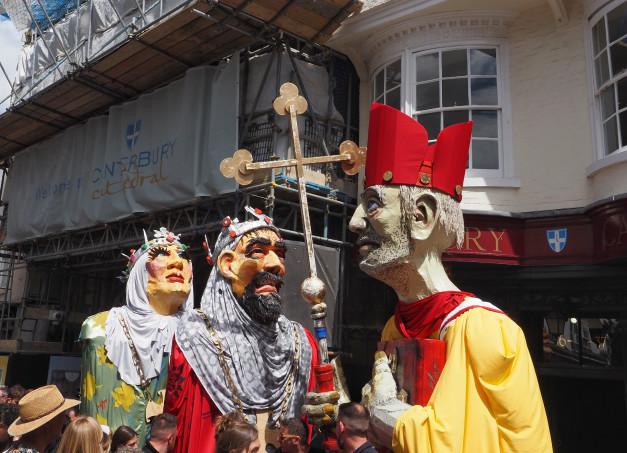
The day will be very busy because in the evening it is the St Thomas More Commemoration Service at St Dunstan’s church at 7.30pm. This annual event on the anniversary of the day More was beheaded is marked by a commemorative civic service, which is attended by the Lord Mayor, local Catholic clergy and members of the legal profession, as well as parishioners and members of the public – all welcome, refreshments after the service. The service includes an address and last year the guest speaker was Dr David Rundle, a specialist in the Renaissance in England at the University of Kent. His subject was ‘From St Dunstan to Thomas More: Canterbury, learning and sanctity’, whereas this year I’ll be giving it under the title ‘Thomas More’s Canterbury’, specifically 1520s Canterbury because it is a fascinating period in the city’s history.
Now as promised here is the report on the CKHH’s 10 years celebratory event that took place yesterday (Wednesday) and was primarily organised by Dr Claire Bartram, one of the Centre’s Co-directors. The idea was to bring together staff and postgraduates from CCCU with our Friends and Partners from Canterbury and all across Kent to showcase what has happened over the last decade, to consider ideas for the future and to offer a space where all these people could talk to each other that was friendly and welcoming – and what better way is there of doing this than over tea and cake in one of the university’s gardens!
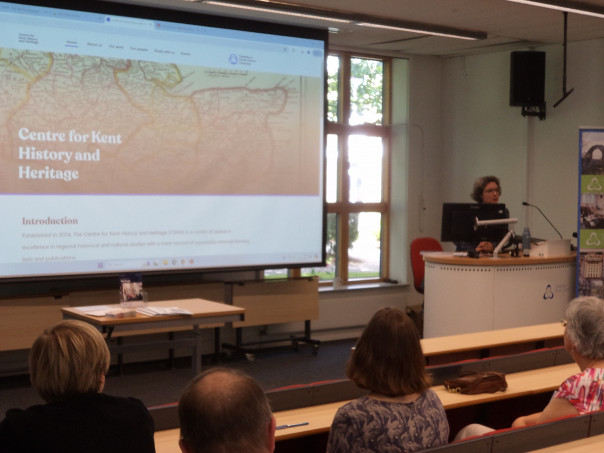
Initially the almost 60 people from all these constituencies had gathered in a Laud lecture theatre where Claire opened the proceedings by welcoming everyone to Christ Church, saying that we were delighted to be able to have this opportunity and thanked everyone for coming along, especially Professor Jackie Eales who had been one of the Centre’s two founders and similarly one of its first Co-directors. As Claire said, we want to build on these 10 years for the next decade and she will be sending out a questionnaire to canvas views and ideas concerning how we can do even more together to enhance our knowledge exchange, outreach and impact capabilities working with Friends and Partners across what might be loosely termed the heritage sector.
Having set the ball rolling, I looked back over the last decade at the 5 areas in which the CKHH has been primarily involved. These are: organising educational events for the public, staff and students; working with other colleagues in Humanities and those in other sectors of the university; encouraging partnerships by working with individuals and local and regional organisations; hosting a website to provide information and educational features, and fifthly, enhancing the research culture by encouraging the postgraduate study of Kent history, as well as research and publication by staff members.
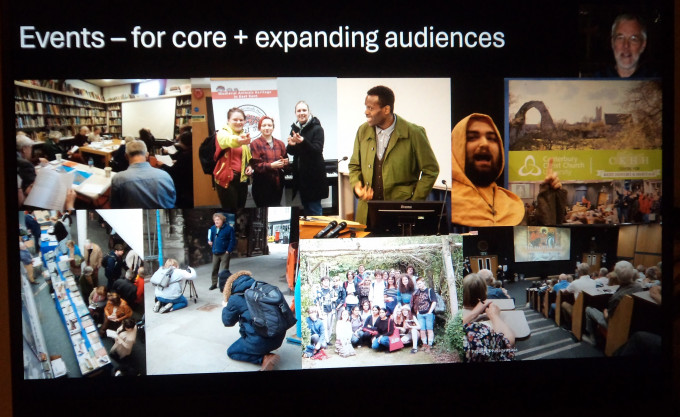
To give a couple of examples for each of these areas, for our events, we have a core and ever expanding audience for the History Weekends because people wish to come to Canterbury to hear high quality talks and go on guided tours in the company of experts to explore the Middle Ages and the Tudors & Stuarts: https://ckhh.org.uk/history-weekends So if you haven’t been to one of these, please check out earlier ones and as advance notice Tudors & Stuarts 2025 will be the weekend of Friday 25 to Sunday 27 April. Other events are the annual Becket and Nightingale Lectures, the latter in conjunction with our partner Brook Rural Museum, and I have to say we have had some great lectures but my favourite remains Michael Wood’s Becket Lecture in 2023 on the Canterbury School of Theodore and Hadrian: https://blogs.canterbury.ac.uk/kenthistory/one-completely-lost-blog-and-therefore-this-is-the-6th-lost-blog/ In addition, we have held a wide variety of conferences – again these have featured in the CKHH blog, as well as numerous study days and workshops. As part of these events, I would like to thank Craig Dadds and his team in the CCCU Bookshop, as well as the AV team for their help over and beyond the call of duty – many thanks to all of you!
Moving on to our second area, we have worked with a wide range of colleagues including Professor Peter Vujakovic’s (Geography and Sustainability) ‘Green Heritage’ workshops and his ‘Heritage A – Z’, with Dr John Bulaitis (History) ‘Tithe through the Ages’ conference and Nightingale Lectures (the second will be in September 2024), and with Professor Carolyn Oulton (English), both as members of her ‘Being Human’ team and as presenters at her Kent Maps Online annual symposia. All of these, too, have featured in the CKHH blogs.
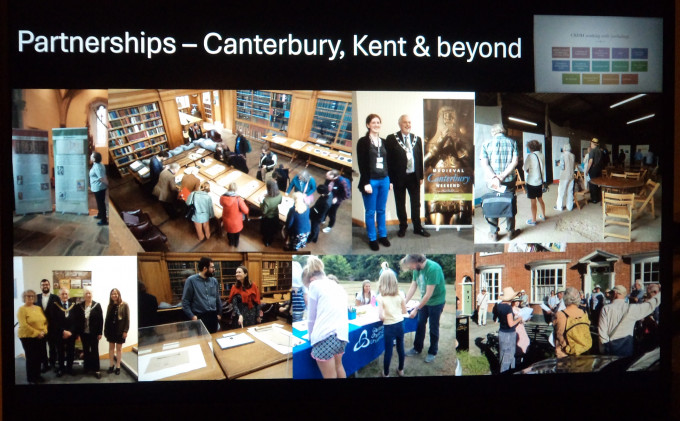
Our activities with our Friends and Partners have included many of our events, but we have gone well beyond these to include such joint projects as – ‘Kent’s Maritime Communities’, ‘Understanding the Gough Map’, and ‘Magna Carta and Beyond’. Exhibitions are another aspect of our partnership work and we have held these at Canterbury, Faversham, Maidstone, Folkestone and Dover, as well as the travelling ‘Magna Carta’ exhibition organised by Professor Louise Wilkinson. Study days have been another favourite over the years, including working with CAT, FCAT, Brook Rural Museum, the Kent History Federation, KAS, various Kent churches, Kent Archives Service and Canterbury Cathedral Archives to name but a few, while in terms of organising workshops and other activities for younger people and their families, the annual ‘Medieval Pageant’ and Dr Diane Heath’s ‘Medieval Animals Heritage’ spring to mind.
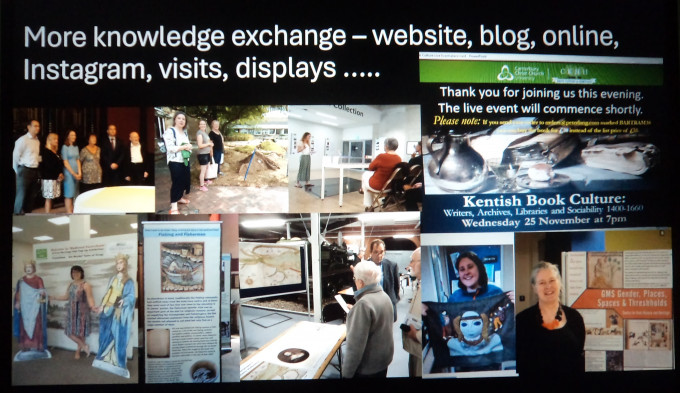
The Centre has been lucky to have first Matthew Crockatt and latterly Ben Cornwell to build the CKHH’s websites. Moreover, this social media presence has latterly included Instagram and the blog, which started on 24 October 2014 will, if it continues at its present rate, reach the 500 milestone later this year. As well as being a valuable record of past events and thus a vital legacy, provided they don’t get ‘lost’ again, the blogs provide a wealth of historical information and have been used by teachers, students and researchers.
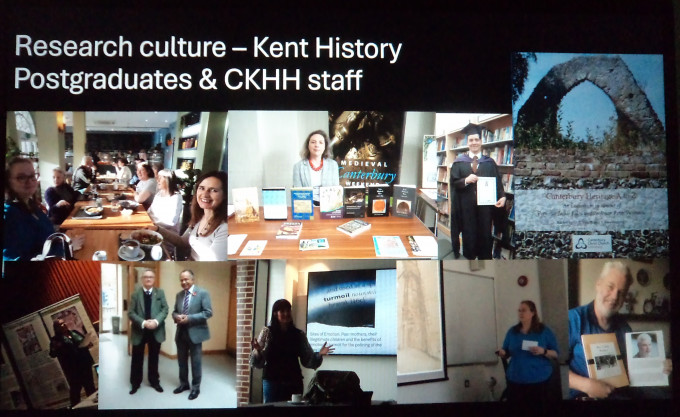
Finally, the Centre has fostered a research culture through the Kent History Postgraduates, who meet regularly both in person and online to share ideas and offer mutual support. Additionally, the Ian Coulson Memorial Postgraduate Award fund has helped getting on for 20 postgraduates so far and in a climate where funding for postgraduates is at best minimal, this is a brilliant initiative that was originally kickstarted by the surplus from the 2016 Medieval Canterbury Weekend. Furthermore, this research culture encompasses both staff and students, and is both inward and outward looking as evidenced, for example, by our presence at the Kent and Medway History Showcases, by sessions at Kent’s MEMS Fest on several occasions, through giving papers at conferences in Britain and abroad, and by leading workshops at CCCU and elsewhere.
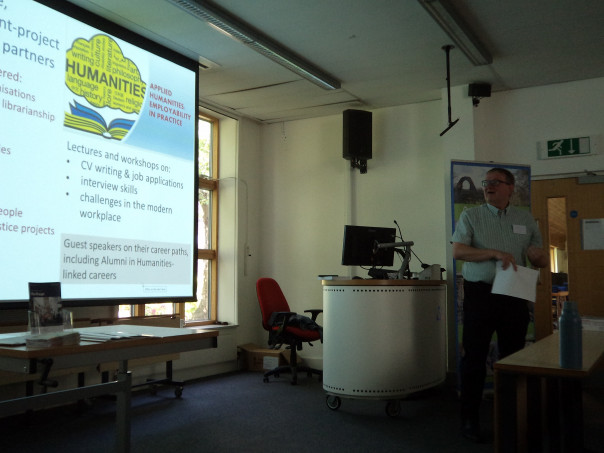
The next speaker was John Bulaitis who showcased the activities of students who have been taking the Applied Humanities module in the 2nd year of their BA degree. As he said, this module was initiated by Dr Sara Wolfson, later taken over by Claire Bartram and latterly has been run by John. At the core is the project that the student undertakes with either an external or internal partner, and in addition the module offers lectures and workshops covering such topics as career progression in the heritage sector, writing a CV, interview skills and facing challenges in the modern workplace. Using the students’ own words, John provided several examples of how much they felt they had gained from their experiences, whether it was working on the oral history of hop pickers for Brook Rural Museum, digitising materials from the Dickens House Museum, working on archival sources at either the Special Collections, University of Kent or the Amelia Scott Museum. For in many cases the students felt that it had given then valuable research and other skills, had provided them with potential career paths they hadn’t previously considered and made them feel part of a community beyond the seminar room – as John concluded these were real partnerships for both sides.
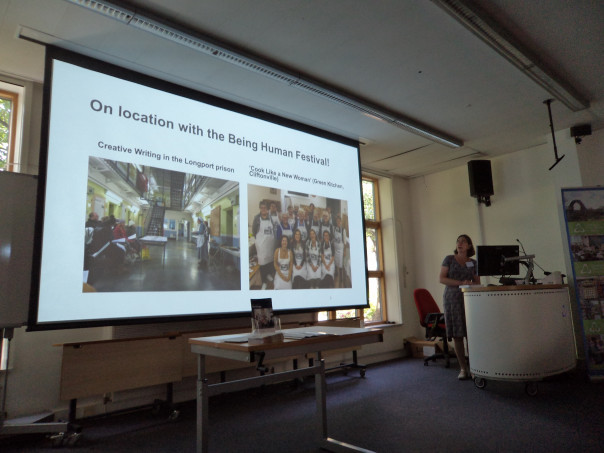
John was followed by Carolyn Oulton who featured several projects that she and her colleagues had led at CCCU as part of the annual ‘Being Human’ festival. The aim of these is to engage the public using academic research in a two-way conversation which takes this knowledge exchange into the world. This has meant that such events have taken place in the old Canterbury prison, by the Westgate Towers, at the Leas in Folkestone and in Barham parish church. As well as CCCU staff members beyond English Literature, Carolyn and Susan Civale have recruited undergraduates and postgraduates to help plan and run these events, and for their ‘Canterbury Tales’ series, Susan was the lead for the project where students wrote and filmed a play about suffragettes and the giving out of white feathers, which also featured several sixth-form students from the Harvey Boys Grammar School in Folkestone.
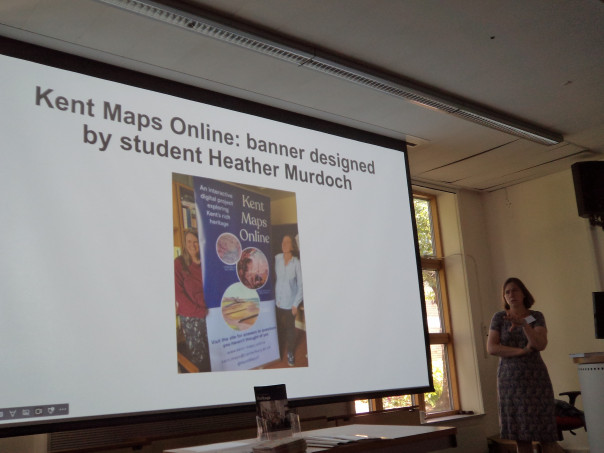
Carolyn’s second example was her and Michelle Crowther‘s Kent Maps Online project and these interactive maps have similarly offered heritage partners and students a range of ways to get involved. Such connections continue to grow and are also fostered through the annual symposium that each year takes a different theme. For those interested, please see: https://ckhh.org.uk/our-work/project/kent-digital-maps
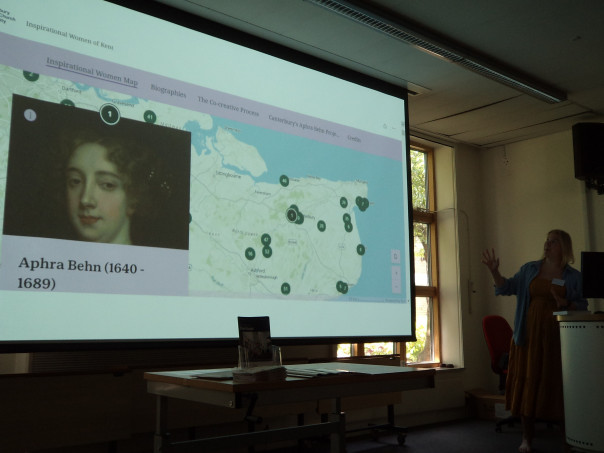
Dr Catriona Cooper followed Carolyn and highlighted the growing number of digital projects she is engaged in at CCCU working with Dr Ralph Norman (Theology) on the St Augustine’s Missionary College, with Diane Heath and her medieval animals, Dr Astrid Stilma (English) on Aphra Behn, and Professor Alan Meades (Design and Photography) on games design. Having discussed these briefly, she drew attention to the new MA in Heritage that is due to start in September and how such digital skills will be at the heart of this degree in order to provide students with the necessary tools to compete in the heritage sector. Thus, it will be an innovative degree programme that will include the option of undertaking a project rather than the usual final dissertation.
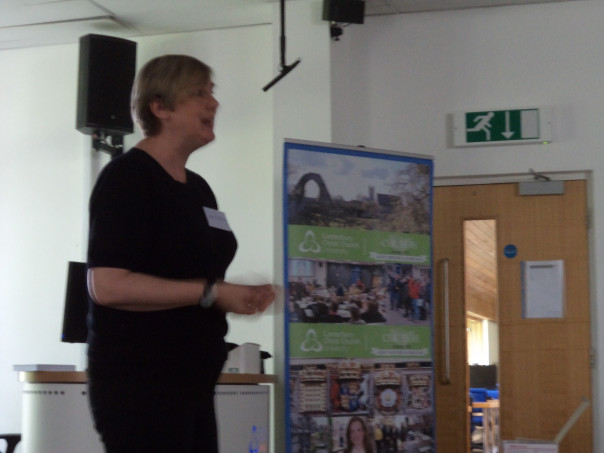
Astrid Stilma gave the final presentation on the Aphra Behn project which has involved a series of events that will culminate in an international conference this summer. Additionally, currently there is an excellent exhibition at the Beaney which is open to the public, and such public engagement will be available at the conference through a small number of talks and performances of Behn’s ‘The Amorous Prince’. Furthermore, even though the project ends this August, the new statue of Behn will be installed outside the Beaney, with an opening ceremony next February.
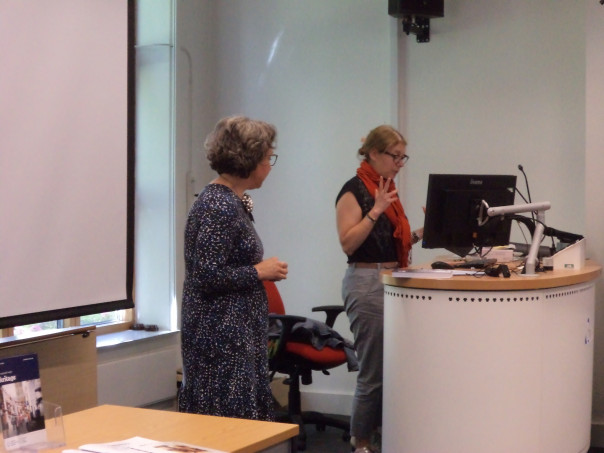
By way of conclusion before we headed to Coleridge Garden for refreshments, Dr Stefania Ciocia, as the Head of the School of Humanities and Educational Studies, concluded by saying it had been great to witness the enthusiasm of the staff in seeking to reach a broad audience. Moreover, she was delighted to see the forward thinking and innovative approaches that are on offer through staff at Christ Church; and finally, she was heartened to see how Applied Humanities was helping students to find confidence, broaden their horizons and mean that they saw themselves as researchers.
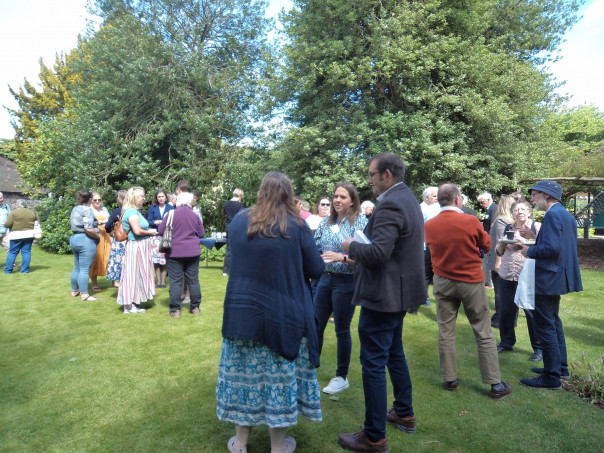
Having finished the more formal part of the proceedings, we all headed out into the summer sunshine and enjoyed refreshments, and it was excellent to witness the many conversations that were taking place as people discovered new links and connections between their various specialisms and organisations. Thus, it was a major success and hopefully will lead to new opportunities to work together.
 Centre for Kent History and Heritage
Centre for Kent History and Heritage Sheila Sweetinburgh
Sheila Sweetinburgh 2160
2160

